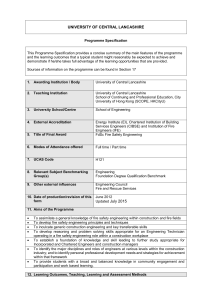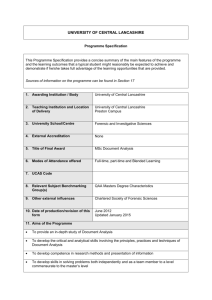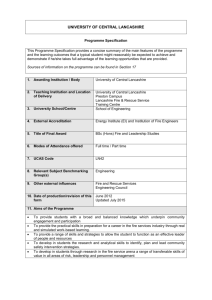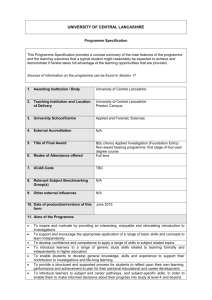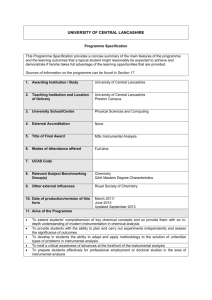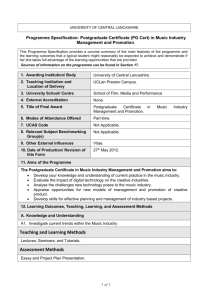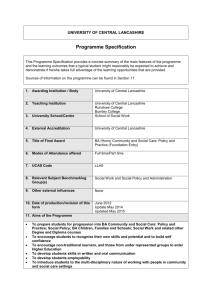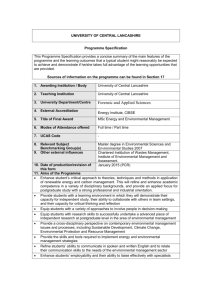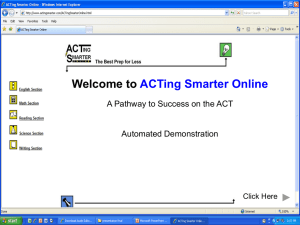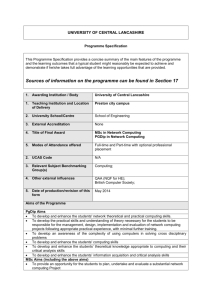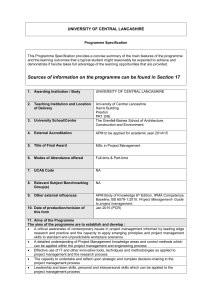BSc (Hons) Applied Sciences (Foundation Entry) (Sept 2014)
advertisement
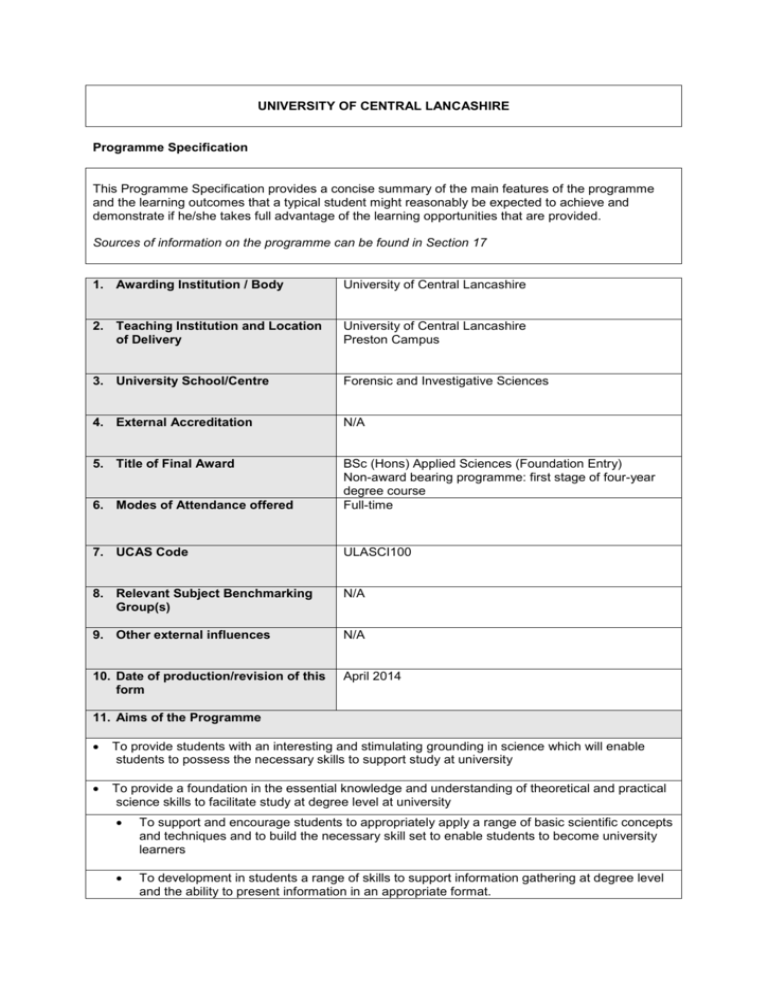
UNIVERSITY OF CENTRAL LANCASHIRE Programme Specification This Programme Specification provides a concise summary of the main features of the programme and the learning outcomes that a typical student might reasonably be expected to achieve and demonstrate if he/she takes full advantage of the learning opportunities that are provided. Sources of information on the programme can be found in Section 17 1. Awarding Institution / Body University of Central Lancashire 2. Teaching Institution and Location of Delivery University of Central Lancashire Preston Campus 3. University School/Centre Forensic and Investigative Sciences 4. External Accreditation N/A 5. Title of Final Award 6. Modes of Attendance offered BSc (Hons) Applied Sciences (Foundation Entry) Non-award bearing programme: first stage of four-year degree course Full-time 7. UCAS Code ULASCI100 8. Relevant Subject Benchmarking Group(s) N/A 9. Other external influences N/A 10. Date of production/revision of this form April 2014 11. Aims of the Programme To provide students with an interesting and stimulating grounding in science which will enable students to possess the necessary skills to support study at university To provide a foundation in the essential knowledge and understanding of theoretical and practical science skills to facilitate study at degree level at university To support and encourage students to appropriately apply a range of basic scientific concepts and techniques and to build the necessary skill set to enable students to become university learners To development in students a range of skills to support information gathering at degree level and the ability to present information in an appropriate format. To encourage students to develop systematic and critical thinking skills necessary for university level study To build self-confidence through self-assessment and reflective practices to develop and build on their employability skills To give students the confidence and competence to apply a range of skills to subject related topics that will underpin their development towards university level study 12. Learning Outcomes, Teaching, Learning and Assessment Methods A. Knowledge and Understanding A1. Describe and apply basic theoretical and practical generic science A2. Apply relevant mathematical techniques A3. Explain specific scientific topics needed for progression Teaching and Learning Methods Lectures, tutorials, laboratory/practical session, directed reading, problem-solving, workshops, discussions Assessment methods In class and end of module tests; assignments; portfolio; practical and project reports B. Subject-specific skills B1. Work safely and competently in the laboratory B2. Analyse practical results and given data B3. Prepare scientific reports Teaching and Learning Methods Lectures, tutorials, laboratory/practical session, directed reading, problem-solving, workshops, discussions Assessment methods Practical reports and competence assessments; project report and group presentations C. Thinking Skills C1. Select and collate information from a range of sources C2. Describe the differences between qualitative and quantitative data and be able to select the appropriate methodology C3. Formulate and test selected scientific concepts and hypotheses, interpretation and application of concepts C4. Plan, conduct research, carry out independent analyse and present the results both orally and in an appropriate written format Teaching and Learning Methods Lectures, tutorials, laboratory/practical session, directed reading, problem-solving, workshops, discussions Assessment methods Project/practical reports; poster presentation and tutorials/workshops and seminars D. Other skills relevant to employability and personal development D1. Research and reflect on a range of sources of information from books, scientific reports and journals, and the Internet D2. Write reports in a concise, coherent format D3. Demonstrate personal organisation and time management skills D4. Take lecture notes, plan and write essays and reports D5. Reflect and review as part of on-going professional development D6. Undertake effective examination revision and data analysis and interpretation D7. Communicate and present information effectively, using relevant IT skills D8. Work to high standards independently and as part of a team Teaching and Learning Methods Lectures, tutorials, laboratory/practical session, directed reading, problem-solving, workshops, discussions Assessment methods Assignments and portfolio, practical and project reports; performance in personal tutorials/seminars, timed essay, competence based checklist 13. Level Level 3 Programme Structures Module Code FZC005 FZC006 FZC007 FZC008 FZC009 FZC010 Module Title Skills for Science Biology Chemistry Biochemistry Mathematics Physics 14. Credit rating 20(C) 20(C) 20(C) 20(C) 20(C) 20(C) Awards and Credits* Requires completion of 120 credits at Level 3. Successful completion of the course leads to progression on to Year 1 of: BSC Hons Chemistry Forensic Chemistry Forensic Science Forensic Science and Anthropology Sport Science Nutrition and Exercise Science (all routes) Strength and Conditioning In order to progress to the programmes listed below students must achieve the indicated mark. Biological Sciences 65%. Biomedical Science 65%. Physiology and Pharmacology 65%. Neuroscience 60% Other courses may also become available. Students who exit after the Foundation year will receive a transcript of their modules and grades. 15. Personal Development Planning PDP is delivered and monitored through skills modules and the personal tutor system. Students are provided with a PDP handbook in electronic format and are introduced to the idea by their personal tutor (PT). Their PT will then guide them throughout their time at university, both in constructing their PDP and in making sure that they are developing the right skills, helping them to identify and address any issues. Each student sees their PT six times a year for a small group tutorial where the PT and other students will discuss a particular skill or employability issue. Typically the student will have prepared a document or done a task in preparation for the meeting. These tutorials help students to identify and develop their skills and also encourage a culture of confidence between tutee and PT, so that if any specific problems arise with a student the PT will be in a position to assist. The PT topics are constantly reviewed and updated in response to current practice in the workplace and to feedback from PTs and tutees. PTs insist on seeing a completed PDP before writing references. 16. Admissions criteria Programme Specifications include minimum entry requirements, including academic qualifications, together with appropriate experience and skills required for entry to study. These criteria may be expressed as a range rather than a specific grade. Amendments to entry requirements may have been made after these documents were published and you should consult the University’s website for the most up to date information. Students will be informed of their personal minimum entry criteria in their offer letter. Entry to this Programme requires DDD or above at A2 including Biology or Chemistry. BTEC ND DMM-DDM Access to HE, IB 25 - 27P including grade 5 in Biology or Chemistry. In addition applicants will be required to have Maths and English GCSE at Grade C or equivalent. International Applicants will be required to have a minimum level of proficiency in English Language equivalent to IELTS grade 6 with no sub score lower than 5.5. Please consult the UCLAN admissions department for the most up to date requirements. 17. Key sources of information about the programme University web site (www.uclan.ac.uk) UCAS web site (www.ucas.ac.uk) School website (www.uclan.ac.uk/forensic) Course Leader Admissions tutor Level 3 18. Curriculum Skills Map Please tick in the relevant boxes where individual Programme Learning Outcomes are being assessed Programme Learning Outcomes Core (C), Compulsory Knowledge Subject-specific Thinking Skills Module (COMP) or and Skills Level Code Module Title Option (O) understanding Note: FZC005 FZC006 FZC007 FZC008 FZC009 FZC010 Skills for Science Biology Chemistry Biochemistry Mathematics Physics COMP COMP COMP COMP COMP COMP A1 A2 A3 B1 B2 B3 C1 C2 C3 C4 D1 Other skills relevant to employability and personal development D2 D3 D4 D5 Mapping to other external frameworks, e.g. professional/statutory bodies, will be included within Student Course Handbooks D6 D7 D8
